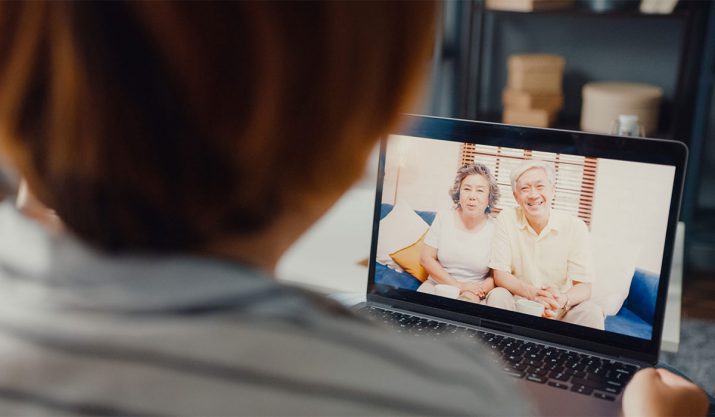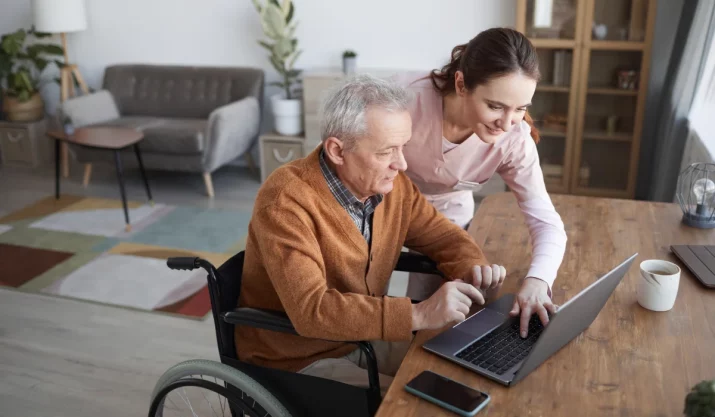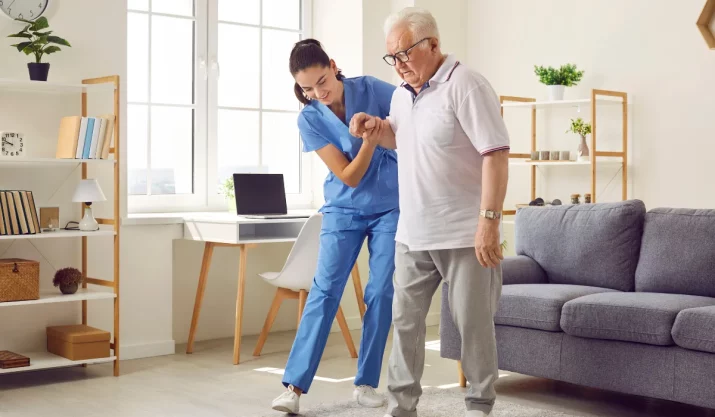Monitoring Elderly Parents Remotely

Table of Contents
There are all kinds of factors that go into monitoring elderly parents remotely, and no two caregivers will face the same struggles or have the same concerns when it comes to deciding how to best care for their family members.
Before choosing any kind of monitoring system, it’s important to have a conversation with the seniors in your life. What sorts of things do they need to feel safe and cared for? Some seniors may be interested in a monitoring device like a wearable or home alarm system, while others might feel comfortable just with services to help them order food and medications.
Have these conversations early and often so everyone stays in the loop – while also maintaining their peace of mind.
Types of Monitoring Options
There are a few different types of senior monitoring devices you can choose from when you’re trying to find the best option for your aging parents.
Monitoring devices can do several things. They are all unique but generally track things like:
- Wellness
- Safety
- Location
- Health
- Comfort
Some devices consist of pendants that serve primarily as fall detection devices, while other remote monitoring devices simply help your parents go about their daily lives with minimal stress and inconvenience – a device like Alexa would be an example.
The most common types of devices children will choose for their elderly parents include:
Wearables
Wearables are quickly becoming the standard of care for seniors, particularly those with medical or mobility issues.
Wearables can monitor all kinds of things including heart rate, fall detection, and even basic data like daily steps taken.
With your parent’s permission, you can receive notifications via a smartphone app for many of these, alerting you to reminders, problems, or emergencies.
Some examples of wearables include:
- FitBit
- MobileHelp Smart
- Life Alert
- Motiv Ring
- Apple Watch
- Lively Mobile
- Freedom Guardian
- Bay Alarm Medical
Of course, the major drawback to wearables exists right within the name – wear. In order for these devices to be effective, they need to be on your parents at all times, or at least within close range.
Studies have shown that there a number of factors which contribute to whether or not a senior adopts the use of a wearable device, including:
- Ease of use – free of physical and mental effort
- Intrinsic motivation – personal goals, functional ability, openness to engage
- Extrinsic motivation – social support, training, feedback, facilitation
- Purpose of device – specific features, role, intended use
Source: https://mhealth.jmir.org/2021/6/e23832
Phone Apps
Phone apps can also be used to help you keep track of your senior parents. These will allow you to do a daily check-in. In some cases, they can offer features such as:
- Medication reminders
- Blood pressure and heart rate monitoring
- Health profile and emergency contact tracking
- Panic button features (in case of a fall or other medical emergency)
Some good options include:
- PillBoxie (the best for medication reminders)
- Senior Safety
- Oscar Senior (one of the best for staying connected with loved ones)
- Red Panic Button (for alerting EMS in the event of a fall or another medical emergency)
- Tell My GEO (for general medical tracking)
These apps can be difficult to use if your parent has dementia or another condition that makes remembering to use the app or keep it turned on challenging. However, if your parents have a lot of buy-in and are looking for ways that they can take charge of their own health and well-being, these apps are great choices.
Home Alarm and Camera Systems
It could just be that you’re concerned about your parent’s home security – not necessarily anything related to their health.
If so, you might want to consider installing a home alarm or camera system. Some of the best for seniors include:
- SimpliSafe
- ADT
- Vivint
- Adobe
- Frontpoint
- Ring Alarm
You might recognize many of these names – they’re all great choices for younger folks, too. However, when installing a home alarm or camera system for a senior, try to choose one that offers more than just local alerts so that you can be notified of an issue, too (many do not or might charge an extra fee).
Also, pay attention to the contract length and whether they can be installed DIY or require the help of a professional.
Medical Alert Devices
A medical alert device is a smart choice for the senior parent with mobility issues.
Some examples include:
- ADT Health
- One Call Alert Systems
- LifeFone
- Lively
- QMedic
- MobileHelp (a great two-way communication option)
- Bay Alarm Medical
Look for a device that best fits the needs of your senior parent and pay attention to the connection. The downside of these devices is that they sometimes need to be worn, while others require the adult to be within a close range in order to activate them.
That said, there are some that offer an in-home coverage range of 1000 feet or more, which can be quite helpful for seniors who forget to put on wearables or simply don’t want to deal with the hassle of having one on at all times.
Video Conferencing Tools
Some caregivers just want to be able to get in touch with their parents at all times – and monitoring isn’t so much of an issue as is accessibility.
If that’s the case, consider a video conferencing tool designed specifically for seniors. The downside of these is, obviously, that they’re for communication and little else. However, they tend to be free or affordable, making them a great introduction to other types of monitoring devices you might want to use later on.
Examples include:
- Konnekt Videophone
- Google Nest Hub
- Amazon Echo
- Video chat apps (like FaceTime, Skype, or Zoom)
Remote Control Devices
These might include devices to operate various utilities in the house, like HVAC or kitchen appliances. They’re great for seniors with mobility issues but won’t really address any of the health or security issues mentioned above.
Some examples include the EasyMote Remote Control and the Sony Universal Remote Control, both of which can be programmed to work with all kinds of utilities and appliances in the home, depending on your needs.
Other Ways To Monitor
In addition to the products you can purchase above to help keep track of your senior parents, there are a few other ways you can make life easier for them (while also keeping tabs on their whereabouts, health, and needs at the same time).
Delivery Services
Consider having groceries and meals delivered to your family. You can keep track of which necessities your family members need simply by looking at the app – and they’ll likely appreciate the convenience of not having to run to the grocery store all the time.
Some good food delivery services to consider include Amazon Fresh, Instacart, Shipt, and Walmart Postmates, but you can view a full list of grocery delivery services here.
Recruit Help
This tip is especially important if you don’t live near your elderly parents. If something goes wrong, who is there to help your parents out?
Communicate with your parents’ neighbors to figure out a plan for what will happen in the event of an emergency (or a possible emergency). They may be able to act as informal caregivers for them, getting them to the hospital if necessary or offering you insights on your parents’ condition when asked.
Transportation Services
In many cases, parents do just fine on their own in their own homes, particularly if those homes are already retrofitted with appropriate upgrades for senior living, like stairlifts and modified showers.
However, driving can be an issue for many seniors, particularly as vision starts to fail and driving a car becomes more uncomfortable.
Fortunately, there are plenty of companies that make this a lot easier. Uber and Lyft are both available just about everywhere, so you don’t have to rely on finding a taxi at the last minute for your parents. As with the grocery delivery services listed above, these transportation services can easily be accessed from an app.
How To Decide Which Tools And Technology Are Your Best Options
There are a few things you’ll want to consider when deciding which elderly monitoring systems will be right for your family.
For one, what does your budget look like? The cost of home monitoring and alert systems can vary widely. Some come with monthly data fees or other obligations while others consist of just a one-time purchase price.
What sorts of features does the device offer? Does it serve to detect or prevent falls? Does it come with emergency buttons with notifications to local emergency services, like the fire department or hospital?
Does the home security device come with other features for safety, such as monitoring for fires, carbon monoxide, and smoke?
Also, consider how practical and easy the device is to use. If your parents are going to be actively involved in using the device, consider their tech abilities when shopping. If they’ve never been exposed to smart homes, then choosing the fanciest technologies might not be the best idea.
Other questions to ask yourself include:
- Where is the device installed? How does it work? Can it be installed or worn in multiple rooms of the home, if necessary (such as the bathroom, kitchen, and bedroom, in case of a fall)?
- Are there complicated software programs that need to be updated regularly?
- Is the device waterproof and shatterproof?
- Is the information on the device secured from data theft and cybercrime?
- Does it include a security camera or other home security features?
- Does it have to be charged every day, and if so, how complicated is the charging process?
- What is the connectivity and mobile range – do you need to be within close proximity to access all of its features, or just some (such as two-way audio)?
Last, but certainly not least, consider how well the device will meet your family’s needs. What sorts of needs, daily routines, and health problems does your elderly relative have?
Special consideration needs to be made when it comes to purchasing a device for a parent who:
- Has significant mobility issues that limit movement from room to room
- Needs medication management systems
- Has dementia or Alzheimer’s
- Requires frequent medical assistance or services (such as having in-home caregivers)
Conclusion
Monitoring your elderly parents remotely can be a sensitive subject – it’s easy for them to feel as though part of their independence and freedom is being stripped away. However, the tools above will make it easier for you to have peace of mind while also allowing your parents to feel well-provided for – and free!
Safety and independence can go hand in hand. Consider the tips above to make this combo a reality.








